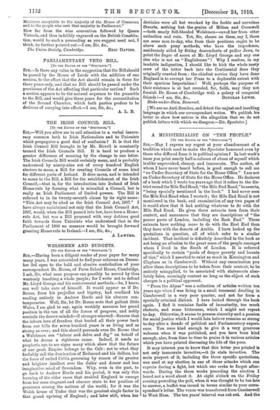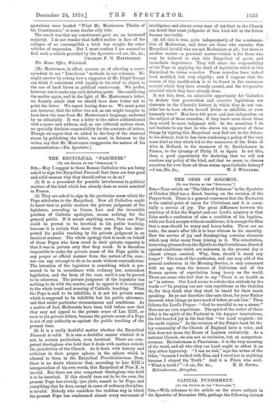A MINISTERIALIST ON "THE PEOPLE."
[To THE EDITOR OP THE "SPECTATOR."] SIR,—May I express my regret at your abandonment of a tradition which used to make the Spectator honoured even by those who differed from it in political opinion P In last week's issue you print nearly half-a-column of abuse of myself which is alike unprovoked, clumsy, and inaccurate. The author, of whom I have never heard before, is good enough to call me "ex-Under-Secretary of State for the Home Office." I am not ex-Under-Secretary of State for the Home Office. He declares of a book which I wrote ten years ago that it refers to the dis- trict round the Mile End Road, "the Mile End Road," he asserts, "being specially mentioned in the book." I had never seen the Mile End Road when I wrote it ; the Mile End Road is not mentioned in the book, and examination of any two pages of it would show that it had nothing whatever to do with the Mile End Road. He gives three extracts torn from their context, and announces that they are descriptions of " the poorer parts of London, including the East End." These extracts have nothing more to do with the East End than they have with the deserts of Arabia. I have looked up the quotations in question, all of which refer to a similar incident. That incident is definitely described in the book as not being an allusion to the great mass of the people amongst whom I lived in the South of London. It is referred specifically to certain "pools of deeper poverty and haunts of vice," which I asserted to exist as much in Kensington and Clapham as in Camberwell. Without any examination you allow these descriptions to be taken from their context, to be entirely misapplied, to be associated with statements abso- lutely false, seemingly content so long as the object of such charges is a political opponent.
" From the Abyss " was a collection of articles mitten ten years ago when I was living in a small tenement dwelling in Camberwell in a very poor quarter, and not far from a specially criminal district. I have looked through the book again. I find it contains faults of immaturity, too much rhetoric, and some bitterness, which I might not repeat to-day. Otherwise, it seems to possess sincerity and a passion for social justice which I would fain believe remains as strong to-day after a decade of political and Parliamentary experi. ence. You were kind enough to give it a very generous welcome when it was published, and you have been kind enough, also, from time to time to praise it in various articles which you have printed discussing the life of the poor.
It may interest you to know that this letter you printed is not only inaccurate invective,—it [is stale invective. The main purport of it, including the three specific quotations, was used at my election in one of those attacks which one expects during a fight, but which one seeks to forget after- wards. During the three weeks preceding the election I heard not a word about it. At eight o'clock on the Friday evening preceding the poll, when it was thought to be too late to answer, a leaflet was issued in terms similar to your corre- spondent's letter. The venue was transferred from Camberwell to West Ham. The ten years' interval was cut out. And the
quotations were headed " What Mr. Masterman Thinks of his Constituents," or some similar silly title.
The result was that my constituents gave me an increased majority. I do not wonder that baffled malice in face of the collapse of so contemptible a trick has sought for other vehicles of expression. But I must confess I am amazed to find such a vehicle provided by the Spectator.—I am, Sir, &c., CHARLES F. G. MISTERMAN.
The Home Office, Whitehall.
[Mr. Masterman, in effect, accuses us of allowing a corre- spondent to use " Limehouse " methods in our columns. We might answer by asking how a supporter of Mr. Lloyd George can think it consistent with loyalty to his chief to object to the use of hard blows in political controversy. We prefer, however, not to make any such debating point. On considering the matter again, and in the light of Mr. Masterman's letter, we frankly admit that we should have done better not to print the letter. We regret having done so. We must point oat, however, that the letter was not, as one might imagine to have been the case from Mr. Masterman's language, endorsed by us editorially. It was a letter to the editor authenticated with a name and address, and, as our editorial notices show, we specially disclaim responsibility for the contents of letters. Though we regret that we added to the fury of the electoral storm by publishing the letter, we must, in fairness to the writer, say that Mr. Masterman exaggerates the nature of his communication.—En. Spectator.]







































 Previous page
Previous page